Firm Dynamics and Employment Outcomes
In a market economy, firm foundations and closures are important drivers of resource (re)allocation, structural change, and economic development which is particularly important with respect to the economic transformation of East Germany from a state-directed to a market economy. At the same time, job displacement coming along with structural change may have serious consequences for affected employees, such as unemployment, earnings losses, or lower job quality in a new job. This research group uses microeconometric methods to analyze foundation, evolution, and failure of firms, the amount and quality of jobs created by new firms and the consequences of firm closures for employees, in particular in terms of labor market outcomes such as employment and wages.
Research Cluster
Productivity and InstitutionsYour contact

Mitglied - Department Structural Change and Productivity
EXTERNAL FUNDING
01.2020 ‐ 06.2024
The Rise of Populist Parties in Europe: The Dark Side of Globalization and Technological Change?
VolkswagenStiftung
Globalisation may have increased prosperity in general, but has also led to unemployment, wage inequality, outward migration and, thus, ageing populations in many European regions. This project examines whether these economic burdens lead to votes for populist parties.
01.2019 ‐ 06.2022
MICROPROD („Raising EU Productivity: Lessons from Improved Micro Data“)
European Commission
The goal of MICROPROD is to contribute to a greater understanding of the challenges brought about in Europe by the fourth industrial revolution and the associated ‘productivity puzzle’ in a context of globalisation and digitisation, and to provide alternative policy options to better address these challenges.
This project has received funding from the European Union’s Horizon 2020 research and innovation programme under grant agreement No 764810.
07.2018 ‐ 12.2020
Firm Wage Differentials in Imperfect Labour Markets: The Role of Market Power and Industrial Relations in Rent Splitting between Workers and Firms
German Research Foundation (DFG)
The main purpose of this proposal is to grasp a firmer understanding of how employment rents are split between workers and employers in imperfect labour markets and how labour market institutions, such as unions and works councils, influence the distribution of rents. In that it not only promises new insights into the wage formation process and the likely consequences of important labour market trends like falling unionisation and worker codetermination, but also promises to inform important public policy debates, such as which rights should be granted to organised labour.
02.2019 ‐ 09.2019
Evaluation of the IAB Establishment Panel 2018 and Preparation of a Results Report for West and East Germany
Final report: Fehlende Fachkräfte in Deutschland – Unterschiede in den Betrieben und mögliche Erklärungsfaktoren: Ergebnisse aus dem IAB-Betriebspanel 2018. IAB-Forschungsbericht 10/2019. (in German, English abstract available)
04.2016 ‐ 03.2019
Wage and Employment Effects of Bankruptcies
German Research Foundation (DFG)
The project analyzes the process and the consequences of firm failure. For the first time, evidence on the consequences of small firms’ bankruptcy on employees’ earnings and wages is provided. The project e.g. shows that employees of small firms are more likely to see their employer failing but, at the same time, face smaller earnings and wage losses than employees displaced from larger firms. Check the below research articles for further insights.
01.2018 ‐ 12.2018
Evaluation of the IAB Establishment Panel 2017 and Preparation of a Results Report for West and East Germany
Final report: Lohnunterschiede zwischen Betrieben in Ost- und Westdeutschland: Ausmaß und mögliche Erklärungsfaktoren. Ergebnisse aus dem IAB-Betriebspanel 2017. IAB-Forschungsbericht 6/2018. (in German, English abstract available)
01.2017 ‐ 09.2017
Evaluation of the IAB Establishment Panel 2016 and Preparation of a Results Report for West and East Germany
Final report: Produktivitätsunterschiede zwischen West- und Ostdeutschland und mögliche Erklärungsfaktoren. Ergebnisse aus dem IAB-Betriebspanel 2016. IAB-Forschungsbericht 16/2017. (in German, English abstract available)
Refereed Publications
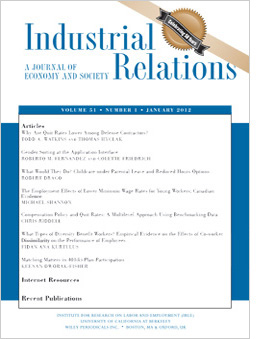
Works Councils and Separations: Voice, Monopoly, and Insurance Effects
in: Industrial Relations, No. 4, 2010
Abstract
Using a large linked employer–employee data set for Germany, we find that the existence of a works council is associated with a lower separation rate to employment, in particular for workers with low tenure. While works council monopoly effects show up in all specifications, clear voice effects are only visible for low tenured workers. Works councils also reduce separations to nonemployment, and this impact is more pronounced for men. Insurance effects only show up for workers with tenure of more than 2 years. Our results indicate that works councils to some extent represent the interests of a specific clientele.
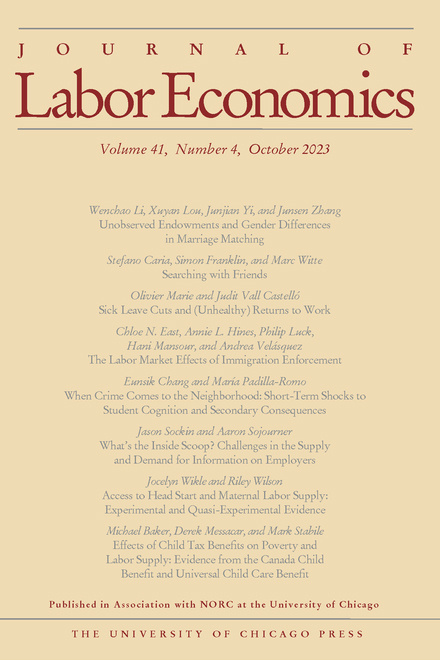
Differences in Labor Supply to Monopsonistic Firms and the Gender Pay Gap: An Empirical Analysis Using Linked Employer‐Employee Data from Germany
in: Journal of Labor Economics, No. 2, 2010
Abstract
This article investigates women’s and men’s labor supply to the firm within a semistructural approach based on a dynamic model of new monopsony. Using methods of survival analysis and a large linked employer‐employee data set for Germany, we find that labor supply elasticities are small (1.9–3.7) and that women’s labor supply to the firm is less elastic than men’s (which is the reverse of gender differences in labor supply usually found at the level of the market). Our results imply that at least one‐third of the gender pay gap might be wage discrimination by profit‐maximizing monopsonistic employers.

The Gender Pay Gap under Duopsony: Joan Robinson meets Harold Hotelling
in: Scottish Journal of Political Economy, No. 5, 2009
Abstract
This paper presents an alternative explanation of the gender pay gap resting on a simple Hotelling-style duopsony model of the labour market. Since there are only two employers, equally productive women and men have to commute and face travel cost to do so. We assume that some women have higher travel cost, e.g., due to more domestic responsibilities. Employers exploit that women on average are less inclined to commute and offer lower wages to all women. Since women's firm-level labour supply is for this reason less wage-elastic, this model is in line with Robinson's explanation of wage discrimination.

Capital Stock Approximation using Firm Level Panel Data: A Modified Perpetual Inventory Approach
in: Jahrbücher für Nationalökonomie und Statistik, No. 4, 2008
Abstract
Many recent studies exploring conditional factor demand or factor substitution issues use firm level panel data. A considerable number of establishment panels contains no direct information on the capital input, necessary for production or cost function estimation. Incorrect measurement of capital leads to biased estimates and casts doubt on any inference on output elasticities or input substitution properties. The perpetual inventory approach, commonly used for long panels, is a method that attenuates these problems. In this paper a modified perpetual inventory approach is proposed. This method provides more reliable measures for capital input when short firm panels are used and no direct information on capital input is available. The empirical results based on a replication study of Addison et al. (2006) support the conclusion that modified perpetual inventory is superior to previous attempts in particular when fixed effects estimation techniques are used. The method thus makes a considerable number of recently established firm panels accessible to more sophisticated production function or factor demand analyses.
Working Papers
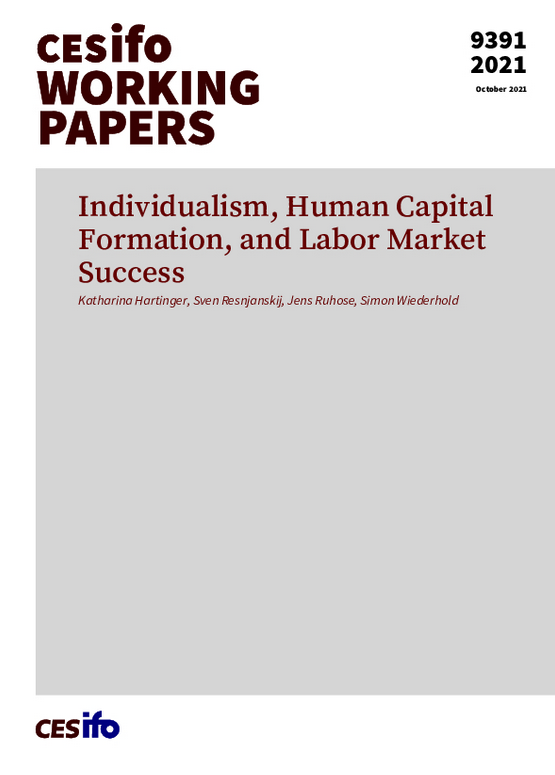
Individualism, Human Capital Formation, and Labor Market Success
in: CESifo Working Paper, No. 9391, 2021
Abstract
There is an ongoing debate about the economic effects of individualism. We establish that individualism leads to better educational and labor market outcomes. Using data from the largest international adult skill assessment, we identify the effects of individualism by exploiting variation between migrants at the origin country, origin language, and person level. Migrants from more individualistic cultures have higher cognitive skills and larger skill gains over time. They also invest more in their skills over the life-cycle, as they acquire more years of schooling and are more likely to participate in adult education activities. In fact, individualism is more important in explaining adult skill formation than any other cultural trait that has been emphasized in previous literature. In the labor market, more individualistic migrants earn higher wages and are less often unemployed. We show that our results cannot be explained by selective migration or omitted origin-country variables.
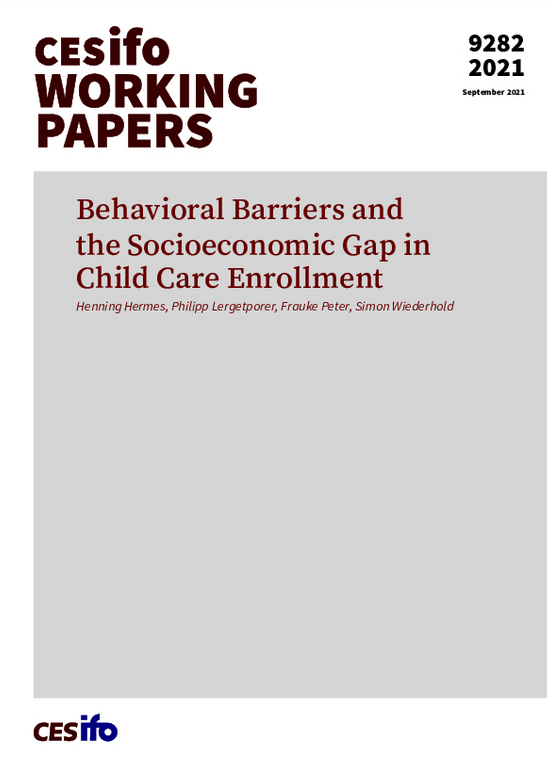
Behavioral Barriers and the Socioeconomic Gap in Child Care Enrollment
in: CESifo Working Paper, No. 9282, 2021
Abstract
Children with lower socioeconomic status (SES) tend to benefit more from early child care, but are substantially less likely to be enrolled. We study whether reducing behavioral barriers in the application process increases enrollment in child care for lower-SES children. In our RCT in Germany with highly subsidized child care (n > 600), treated families receive application information and personal assistance for applications. For lower-SES families, the treatment increases child care application rates by 21 pp and enrollment rates by 16 pp. Higher-SES families are not affected by the treatment. Thus, alleviating behavioral barriers closes half of the SES gap in early child care enrollment.
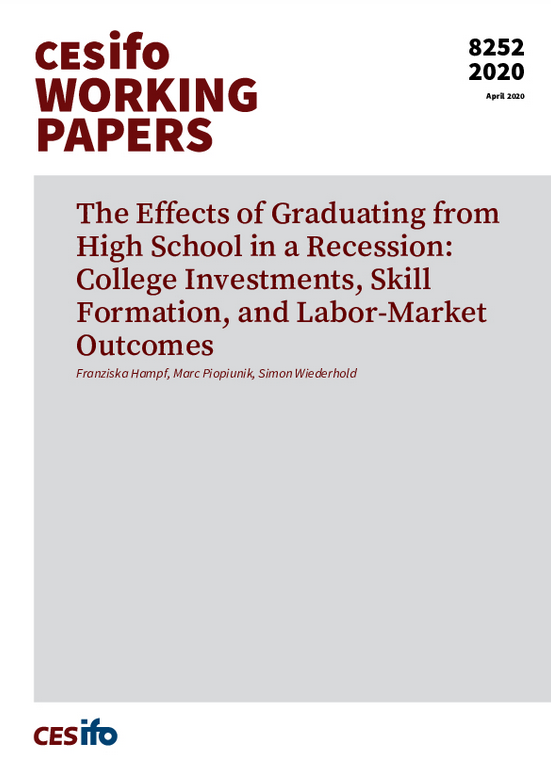
The Effects of Graduating from High School in a Recession: College Investments, Skill Formation, and Labor-Market Outcomes
in: CESifo Working Paper, No. 8252, 2020
Abstract
We investigate the short- and long-term effects of economic conditions at high-school graduation as a source of exogenous variation in the labor-market opportunities of potential college entrants. Exploiting business cycle fluctuations across birth cohorts for 28 developed countries, we find that bad economic conditions at high-school graduation increase college enrollment and graduation. They also affect outcomes in later life, increasing cognitive skills and improving labor-market success. Outcomes are affected only by the economic conditions at high-school graduation, but not by those during earlier or later years. Recessions at high-school graduation narrow the gender gaps in numeracy skills and labor-market success.

Identifying Bankruptcies in German Social Security Data
in: FDZ-Methodenreport, No. 10, 2017
Abstract
Many empirical studies about firm exits point out that it is important to distinguish between different types of closures, e.g., voluntary and involuntary liquidations. This report describes how exits due to bankruptcies can be identified in the German Establishment History Panel (BHP). In contrast to other closures, bankruptcies can be unambiguously regarded as indica-tion for economic failure and can therefore be interpreted as involuntary exits.


















